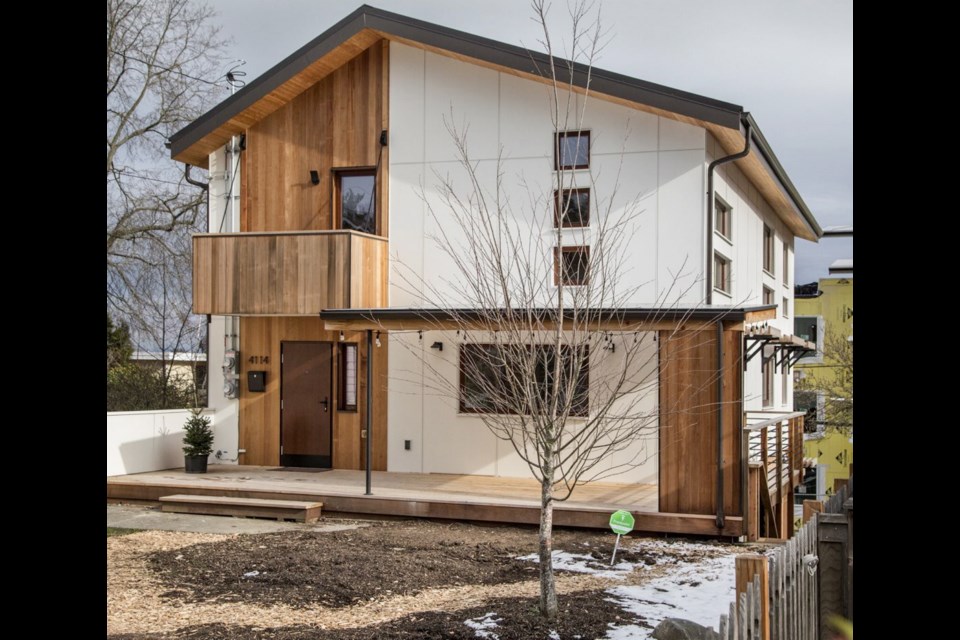SEATTLE — I feel like I’m living in a museum,” says Veena Prasad. She’s smiling, because her family’s gorgeously light and vibrant new home in West Seattle looks nothing at all like a museum — until, maybe, you notice all those explanatory little signs her husband, Andri Kofmehl, has posted on the walls.
Lots of signs. Lots to explain.
Veena and Andri, along with their twin toddlers and Veena’s mother, live in Seattle’s second Built Green Emerald Star home, a supremely certified, super-sustainable showcase of so many features — 9.9 kW of solar photovoltaic panels; airtight structural insulated panels; on-site cisterns that can hold 10,000 gallons of rainwater; extra-efficient toilets, faucets and fixtures; a lower-level unit used as a rental; and local, reclaimed, recycled, certified, non-toxic materials throughout — it would exhaust a lot of energy to even itemize them all.
Which is why, for their housewarming party, Andri says: “We put up these signs. Our house is a topic with everyone we know. We didn’t make a secret of anything. We use it as an educational opportunity to answer people’s questions.”
There were 19 signs in all, pointing out everything from “passive solar design” to “cork floors.” They are awesome and informative, and sometimes entertaining, such as this one in the hearth-free great room: “No Fireplace. Gas fireplaces depend on fossil fuels, and wood fireplaces are problematic for indoor air quality. Too bad, but there’s always the YouTube fireplace!”
The signs also are inspiringly symbolic. This is how planet advocates Andri and Veena live — not just on Earth Day, but every day: walking the walk and talking the talk.
An Emerald Star home is as green as it gets for Built Green, a non-profit residential building program of the Master Builders Association of Washington state’s King and Snohomish counties. This one was built to the organization’s highest standard by net-zero specialists TC Legend Homes, says Built Green program manager Leah Missik — as well as to Andri and Veena’s standards.
“We wanted to make sure the house was our house, and reflected our values: sustainability, innovation and affordability,” says Veena. “We didn’t want an ugly house, but form follows function.”
Veena and Andri moved to Seattle about 10 years ago, Andri says, renting around town six times before finding this family-friendly, high-walk-score neighbourhood, and this site and its 1927 home, which “was not in the best shape.”
“We weren’t going to keep much, and we knew we wanted to build the most sustainable home possible within our budget,” he says. “We’re taking something away that was here, which makes it that much more important to find a way to build a home with a rental unit to increase density. Density is more sustainable than sprawl. There had been three people here. Now, there are up to eight. We’re making more use of the space.”
The home’s design follows a similar philosophy. “We wanted simplicity, nothing superfluous,” Veena says.
Cue sign No. 8!
“Efficient Floor Plan. The house has the shape of a simple box, which maximizes indoor space and minimizes the surface of the house’s envelope, making it more efficient. In designing floor plans, we kept bedrooms small and avoided wasting space on hallways or features like a formal dining room.”
There is not a posted sign for the economics of building a deep-green home, but it’s a crucial, underlying part of the couple’s message.
“By keeping sustainability top of mind, it made things easier and not necessarily more expensive. Product A or B: You ask which is greener, and fine; that decides,” Andri says. “Once you make the decision to build a quality house, it’s usually not so much of a difference to build green.”
Missik adds that with a net-zero home plus a 70 per cent reduction in water use, “You can factor in you’re probably going to get money back from Seattle City Light for electricity, and you will save significantly on your water and sewage bills, and the upfront costs are mitigated.”
With Seattle’s first Emerald Star home, in Ballard, she says, “Part of the certification is that after a couple of years, you go back and look at the bills. In Ballard, they have a slight surplus of energy and a 70 per cent reduction in water use. For Built Green, we make sure there’s a robust checklist upfront. So far, that’s a good protocol.”
Veena and Andri, who both pivoted from corporate careers to nonprofit work, haven’t been in their own lovely Emerald Star home long enough to document such long-term outcomes, but until then, they continue to live, and spread the green word, as if every day is Earth Day. Because it kind of is.
“When you look at the global situation, we have to address our environmental impact in the next 10 years,” says Andri. “It’s just the right thing to do this now — use it as a proof of concept that it’s possible. This house did not cost twice as much; we didn’t have to not have showers. It’s within reach, and we want people to know that so this becomes the new normal.”
Adds Veena: “There’s a sense that going green sounds great, but people feel it’s too expensive or too much work. We need that extra push; sometimes that inspiration helps. When people see someone like us can do this — you don’t have to be a rich, retired executive; it’s something the middle class can aspire to. If we can do our bit to help inspire, we’re happy to do that.”



